Navigating the Divorce Process
Divorce Court Explained: Disposed Meaning Simplified

Were you aware that the word “disposed” carries considerable importance in the context of divorce court cases?
When it comes to divorce cases, “disposed” refers to the final resolution or conclusion of the proceedings. It signifies that the court has made a final decision and the case is no longer pending.
In this article, we will delve into the meaning of “disposed” in divorce court, shedding light on its various forms and implications. Understanding this term is crucial for individuals navigating the divorce process and seeking closure in their cases.
Key Takeaways:
- The term “disposed” in divorce court refers to the final resolution or conclusion of the case.
- It signifies that the court has made a final decision and the case is no longer pending.
- “Disposed” can take various forms, including a final judgment of divorce, settlement agreement, dismissal of the case, or default judgment.
- The specific meaning of “disposed” depends on the circumstances and agreements made by the parties involved.
- Checking the status of a divorce case is important to know if it has been disposed of and closed.
What Does “Disposed” Mean in Civil Court?
In civil court, the term “disposed” refers to the resolution or outcome of a legal case. When a case is disposed of in civil court, it means that the court has made a decision or taken action to finalize the case.
This can include:
- Judgments for the plaintiff or defendant
- Settlements
- Dismissals
- Summary judgments
- Default judgments
- Voluntary or involuntary dismissals
- Permanent injunctions
- Temporary restraining orders
- Specific performance orders
- Declaratory judgments
- Remanding the case to a lower court
The specific meaning of “disposed” in a civil court case depends on various factors, including the nature of the case, evidence presented, applicable laws, and arguments made by the parties involved.
Outcomes of a Disposed Civil Court Case
Once a case is disposed of, different outcomes are possible depending on the specific circumstances. Some possible outcomes of a disposed civil court case include:
- Awarding damages or monetary compensation to the plaintiff
- Requiring the defendant to comply with certain obligations or perform specific actions
- Issuing an injunction or restraining order to prevent certain behaviors or actions
- Dismissing the case if the court determines that there is no legal basis for the claim
- Ordering a retrial or remanding the case to a lower court
These outcomes are determined by the evidence presented, the strength of the arguments made, and the interpretation of the law by the court. It is important for all parties involved to understand the implications of a disposed civil court case and the potential consequences of the court’s decision.
What Does “Disposed” Mean in Criminal Court?
In criminal court, the term “disposed” holds significant meaning. It refers to the final resolution or outcome of a criminal case, indicating that the case has reached a conclusive end. When a criminal case is disposed of, it means that the court has taken action to resolve the matter, and the case is no longer pending before the court.
The specific meaning of “disposed” in a criminal court case can vary depending on the actions taken by the court and the outcomes of the proceedings. There are several possible outcomes when a criminal case is disposed of, including:
- A guilty plea: When the defendant pleads guilty to the charges they are facing.
- A guilty or not guilty verdict: When the court renders a decision after a trial.
- Dismissal: When the case is dismissed, often due to lack of evidence or procedural errors.
- Nolle prosequi: When the prosecutor decides not to pursue the case further.
- Plea bargain: When there is an agreement between the defendant and the prosecutor to resolve the case with a specific outcome, often a lesser charge.
- Deferred adjudication: When the court delays or postpones the judgment, typically subject to certain conditions.
- Mistrial: When the trial is terminated without a final decision due to a significant error or misconduct.
- Death of the defendant: When the defendant passes away during the course of the case.
When a criminal case is disposed, it is important to note that it does not necessarily imply the defendant’s guilt or innocence. The term signifies that the court has taken action to resolve the case, regardless of the specific outcome.
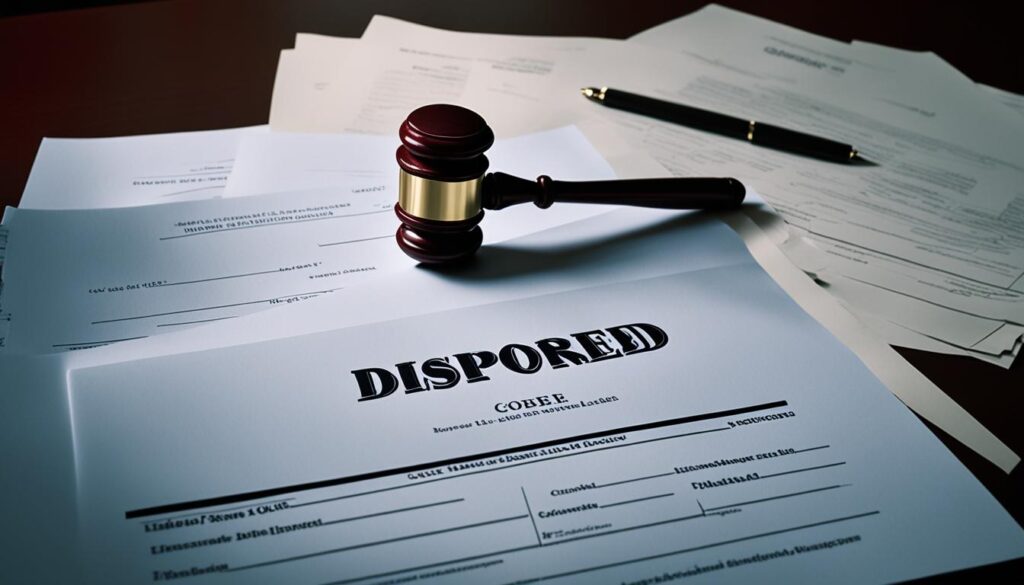
| Outcome | Meaning |
|---|---|
| Guilty Plea | The defendant admits their guilt and accepts charges. |
| Guilty or Not Guilty Verdict | The court makes a decision based on the evidence presented. |
| Dismissal | The case is dismissed due to procedural errors or lack of evidence. |
| Nolle Prosequi | The prosecution decides not to pursue the case further. |
| Plea Bargain | An agreement between the defendant and prosecutor to resolve the case with specific terms. |
| Deferred Adjudication | The court delays the judgment and imposes certain conditions. |
| Mistrial | The trial is terminated without a final decision due to significant errors or misconduct. |
| Death of the Defendant | The defendant passes away during the course of the case. |
What Does “Disposed” Mean in Traffic Violations?
In the context of traffic violations or other minor offenses, the term “disposed” refers to what has happened with the ticket after it was issued. When a traffic violation case is disposed of, it means that a resolution has been reached or a decision has been made regarding the case. The specific meaning of “disposed” in a traffic violation case can vary depending on the actions taken by the court and the outcomes of the proceedings.
After receiving a traffic ticket, there are several possible outcomes for the disposed case:
- Guilty Pleas: The driver admits fault and accepts the consequences, which may include fines, points on their driving record, or traffic school.
- Dismissals: The case is dismissed due to procedural errors, lack of evidence, or other factors.
- Not Guilty Verdicts: The driver is found not guilty of the violation after trial.
- Traffic School/Defensive Driving Courses: In some cases, drivers may have the option to attend traffic school or complete a defensive driving course to avoid points on their record.
- No Contest Pleas: The driver neither admits nor denies guilt but accepts the penalties imposed by the court.
- Cases Continued to a Later Date: The case is postponed or delayed to allow for further investigation or preparation.
- Bench Warrants Issued: If the driver fails to appear in court or comply with the requirements, a bench warrant may be issued for their arrest.
- Amended Charges: The original violation may be reduced or changed to a different offense.
- Trials Pending: The case is awaiting trial in the future.
Each disposition has its own implications and consequences. It is important for individuals facing traffic violations to understand the potential outcomes and make informed decisions regarding their cases.
| Disposition | Description |
|---|---|
| Guilty Pleas | The driver admits fault and accepts the consequences. |
| Dismissals | The case is dismissed due to errors or lack of evidence. |
| Not Guilty Verdicts | The driver is found not guilty after trial. |
| Traffic School/Defensive Driving Courses | Drivers may attend courses to avoid points on their record. |
| No Contest Pleas | The driver accepts penalties without admitting guilt. |
| Cases Continued | The case is postponed or delayed for further investigation. |
| Bench Warrants Issued | Failure to appear may result in a warrant for arrest. |
| Amended Charges | The original violation may be reduced or changed. |
| Trials Pending | The case is awaiting trial in the future. |
Understanding the meaning of “disposed” in traffic violations is essential for individuals facing these charges. By being familiar with the possible dispositions and outcomes, drivers can make informed decisions about how to proceed with their cases and potentially mitigate the impact of the violation on their driving record and insurance premiums.
When Is a Divorce Case Considered “Disposed”?
A divorce case is considered “disposed” when the divorce decree has been signed by a judge and the case is closed. This signifies that the court has reached a final decision regarding the divorce proceedings and the terms of the divorce settlement.
The length of time between an active divorce case and a disposed case can vary depending on the state in which the divorce is filed. It is important to distinguish between a case being disposed with a divorce decree and a case being dismissed, as a disposal signifies that the divorce is finalized, while a dismissal means the case has been thrown out or not properly processed.
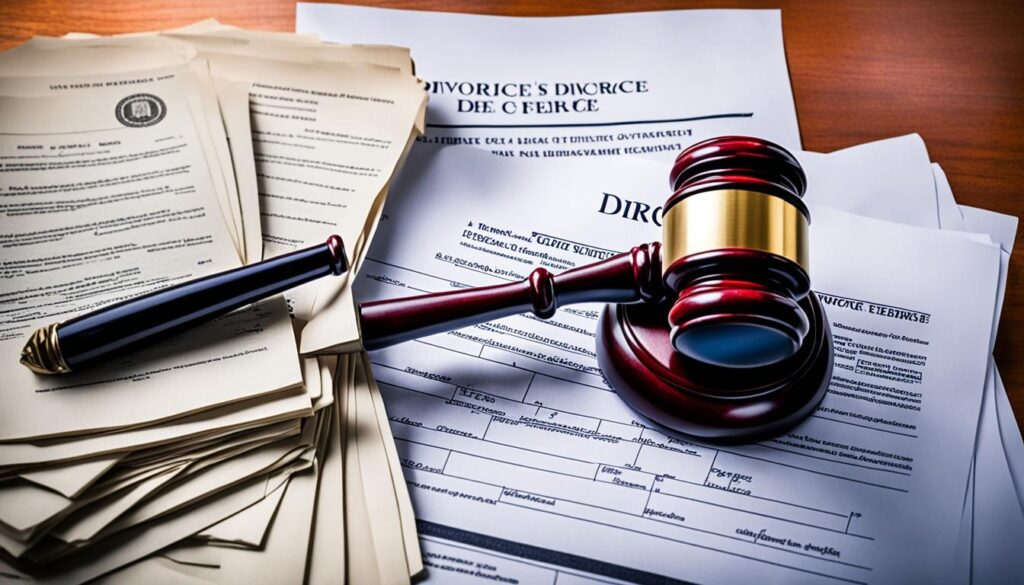
Finalizing a divorce case is a significant milestone for all parties involved. It marks the official end of the legal process and establishes the terms of the divorce settlement, including matters such as property division, child custody, and spousal support.
Obtaining a divorce decree is a crucial step in closing a divorce case. It provides clarity and closure, allowing both parties to move forward with their lives.”
Once a divorce case is disposed of, it is important to keep a copy of the divorce decree as it serves as legal proof of the finalized divorce. This document can be helpful for various purposes, such as changing names, updating financial accounts, or resolving any future disputes that may arise.
It is recommended to consult with an experienced divorce attorney to ensure that all necessary steps are taken to properly finalize a divorce case. They can guide you through the process, ensuring that all relevant documents are filed and all legal requirements are met.
How to Check the Status of a Divorce Case
When going through a divorce, it is natural to want to stay informed about the progress of your case. Checking the status of a divorce case can help you understand where things stand and provide you with peace of mind. There are a few ways you can do this.
Contact Your Divorce Attorney
If you have hired a divorce attorney, they will be the best source of information regarding the status of your case. Reach out to your attorney and ask for an update. They will have access to the necessary documents and court records to provide you with the most accurate information.
Use Online Databases
Many state court systems have online databases where you can search for the status of your divorce case. These databases typically require you to provide specific details such as the case number, date of filing, courthouse location, and names of the parties involved. By entering this information, you can track your case and find out if it has been disposed of or is still pending.
Not all states have online databases, so it is important to check if this option is available in your jurisdiction. If your state does not have an online database, you can consider the following alternatives:
Contact the Courthouse
You can call or visit the courthouse where your divorce case was filed to inquire about the status. The court clerk should be able to provide you with information on whether your case has been disposed of or is still ongoing. Make sure to have your case number and any other relevant details on hand when contacting the courthouse to expedite the process.
Keep Your Address Updated
It is crucial to keep your address updated with the court handling your divorce case. This ensures that you receive any notices or documents related to the finalization of your divorce. Failure to update your address could result in missed notifications, which may impact the progress of your case.
| Methods to Check the Status of a Divorce Case | Pros | Cons |
|---|---|---|
| Contact Your Divorce Attorney | Access to accurate and up-to-date information | Dependent on the availability and responsiveness of your attorney |
| Use Online Databases | Convenient and accessible | Not available in all states |
| Contact the Courthouse | Direct access to court records | Potential delays or long wait times |
![]()
By using these methods, you can stay informed about the status of your divorce case. Remember to be patient, as the legal process can sometimes take time. Keeping yourself updated will help you navigate through the divorce proceedings more confidently.
Understanding Disposed Cases in Family Court
In family court, a disposed case signifies that a judge has reached a decision on the matter at hand or that the case has been resolved in some way. Disposition in family court can take various forms, such as through an agreement between the parties, a ruling by the judge, or dismissal of the case. It is important to understand the meaning of “disposed” in family court in order to navigate the legal system effectively. Unlike civil or criminal court cases, a disposed case in family court does not necessarily mean the case is closed, as family court cases involving ongoing disputes or child custody issues may remain open even after a disposition.

| Outcomes | Explanation |
|---|---|
| Agreement Between Parties | The parties involved in the family court case reach an agreement on certain terms, such as child custody, visitation rights, or property division. |
| Ruling by Judge | The judge presiding over the family court case makes a final decision based on the evidence and arguments presented by the parties. |
| Dismissal of the Case | The court dismisses the case due to legal technicalities, lack of jurisdiction, or other reasons. |
It is important to approach family court cases with a clear understanding of what it means for a case to be disposed. While it may indicate a resolution, the underlying issues in family court cases often require ongoing attention even after a disposition. Parties involved should seek proper legal counsel to fully comprehend the implications of a disposed family court case and to ensure their rights and responsibilities are adequately protected.
The Difference Between Disposed and Dismissed Cases
In legal cases, the terms “disposed” and “dismissed” hold distinct meanings and outcomes. It is important to understand the difference between these terms to grasp the status and resolution of a legal case.
Disposed:
When a case is “disposed,” it signifies that the case has been finalized or resolved. The specific outcome of a disposed case can vary depending on the context and nature of the legal proceedings. It may indicate a favorable or unfavorable resolution, depending on the circumstances.
Dismissed:
On the other hand, when a case is “dismissed,” it means that the case has been thrown out or not properly processed by the court. This can occur due to procedural errors, lack of evidence, jurisdictional issues, or other legal reasons. Dismissal typically results in the termination of the case without any final resolution.
It is crucial to distinguish between the terms “disposed” and “dismissed” to accurately assess the status and outcomes of legal cases.
| Disposed Cases | Dismissed Cases |
|---|---|
| Finalized or resolved | Thrown out or not properly processed |
| Favorable or unfavorable outcome | Termination of the case |
| Varies depending on the context and nature of the case | Occurs due to procedural errors, lack of evidence, jurisdictional issues, or other legal reasons |
Understanding the difference between disposed and dismissed cases is essential for individuals navigating the legal system. Properly interpreting the status and resolution of a case can help individuals make informed decisions and take appropriate legal action.
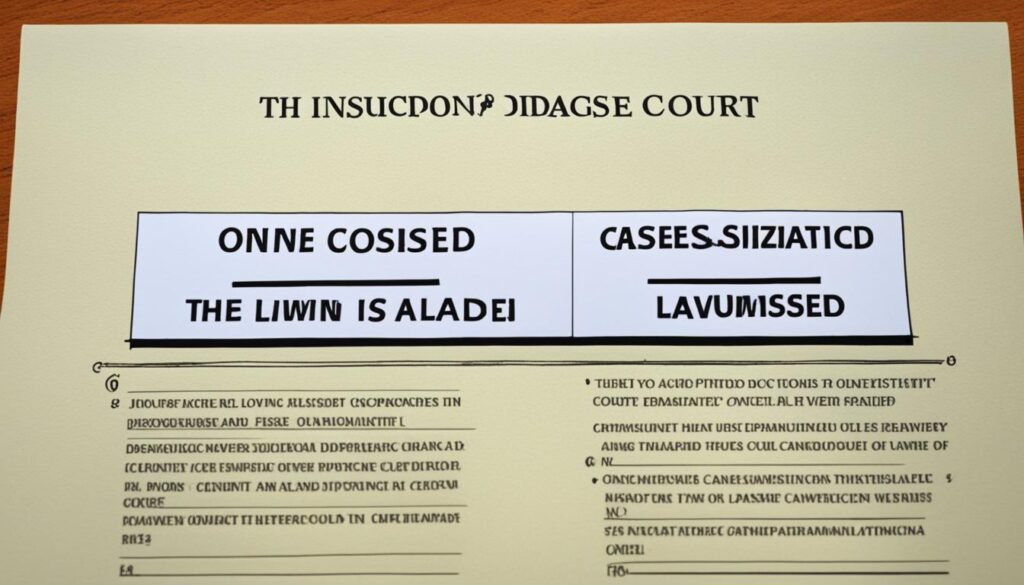
Conclusion
In summary, understanding the meaning of “disposed” in divorce court is of utmost importance for individuals going through divorce proceedings. When a case is disposed in divorce court, it signifies that the divorce decree has been signed and the case is officially closed. The specific outcomes and implications of disposed cases can vary depending on the context, whether it is civil, criminal, traffic violations, or family court.
To effectively navigate the legal process, it is crucial to check the status of a divorce case and differentiate between disposed and dismissed cases. Disposed cases indicate a final resolution, while dismissed cases refer to those that have been thrown out or not properly processed. Being aware of this distinction can help individuals understand the status and potential next steps in their divorce proceedings.
Finalizing a divorce case through disposition is significant as it brings closure to the proceedings and establishes the terms of the divorce settlement. It allows individuals to move forward with their lives and begin the next chapter. Whether the outcome of a disposed case is favorable or unfavorable, being well-informed about the disposition process ensures that individuals have a clear understanding of the resolution reached in their divorce case.
FAQ
What does “disposed” mean in divorce court?
In divorce court, “disposed” refers to the final resolution or conclusion of a divorce case. When a divorce case is “disposed of,” it means that the court has made a final decision regarding the divorce proceedings, and the case is no longer pending before the court.
What does “disposed” mean in civil court?
In civil court, “disposed” refers to the resolution or outcome of a legal case. When a case is disposed of in civil court, it means that the court has made a decision or taken action to finalize the case.
What does “disposed” mean in criminal court?
In criminal court, “disposed” refers to the final resolution or outcome of a criminal case. When a criminal case is disposed of, it means that the case has reached a conclusion, either through a guilty plea, guilty/not guilty verdict, dismissal, or other outcomes.
What does “disposed” mean in traffic violations?
In the context of traffic violations or other minor offenses, “disposed” indicates what has happened with the ticket after it was issued. Common dispositions include guilty pleas, dismissals, not guilty verdicts, traffic school, and trials pending.
When is a divorce case considered “disposed”?
A divorce case is considered “disposed” when the divorce decree has been signed by a judge and the case is closed. This signifies that the court has reached a final decision regarding the divorce proceedings and the terms of the divorce settlement.
How to check the status of a divorce case?
To check the status of a divorce case, you can contact your divorce attorney or search for online databases provided by the state court system.
What is the meaning of “disposed” in family court?
In family court, a disposed case signifies that a judge has reached a decision on the matter at hand or that the case has been resolved in some way.
What is the difference between disposed and dismissed cases?
Disposed means that a case has been finalized or resolved, while dismissed means that a case has been thrown out or not properly processed.
Source Links
- https://www.thehivelaw.com/blog/what-does-disposed-mean-in-court/
- https://www.ejcl.org/what-does-disposed-mean-in-family-court/
- https://www.jacksonwhitelaw.com/arizona-family-law/disposed-mean-divorce-case/
Maya brings a wealth of experience in providing emotional support to individuals facing life’s challenges. Her contributions to How Get Divorce are characterized by empathy, understanding, and a profound sense of authority on matters of emotional well-being. Maya’s work is dedicated to ensuring that our community feels supported and understood, offering tools and advice to cope with the emotional aspects of divorce.
Navigating the Divorce Process
How to Get Your Attorney Fees Paid in a Divorce
In navigating divorce, understanding how to secure payment for attorney fees is crucial, but what happens if you miss a critical step?

Navigating through the intricacies of divorce, making sure you have your legal fees covered is an essential component of the process. For example, in some areas, like Texas, it’s crucial to incorporate a formal plea for the payment of fees in your initial divorce filing.
But what happens if this step is overlooked or not done correctly? Understanding the underlying principles and legal strategies that influence the payment of attorney fees in a divorce can significantly impact the outcome of your case.
Let's explore the nuances of getting your attorney fees paid in a divorce and the strategic approaches that can help secure financial assistance for legal representation.
Key Takeaways
- Request interim attorney fees based on financial need during divorce.
- Judges can order fee payments from community assets or spouse's income.
- Discuss financial situation openly to negotiate fair attorney fee payment.
- Consider alternative payment sources like selling assets or incurring debt.
Legal Options for Attorney Fees
When facing the financial burden of attorney fees in a divorce, understanding the legal options available is crucial for securing fair representation. In a community property state like Texas, spouses may be entitled to have their attorney fees paid from community assets.
Interim attorney fees can also be requested during the divorce proceedings to ensure both parties have access to legal representation. It's essential to seek legal assistance to navigate the complexities of these financial matters.
Judges have the authority to order payment of attorney fees based on the ability to pay from community assets. They carefully assess the reasonableness of the fees requested and may order payment from various sources. Methods to pay one's spouse's attorney fees can include making periodic payments from income, selling nonliquid property, or even incurring debt if necessary.
Ensuring that attorney fees are addressed promptly and fairly is crucial, especially in cases involving child custody where legal representation is vital for protecting one's rights.
Factors Influencing Fee Payment
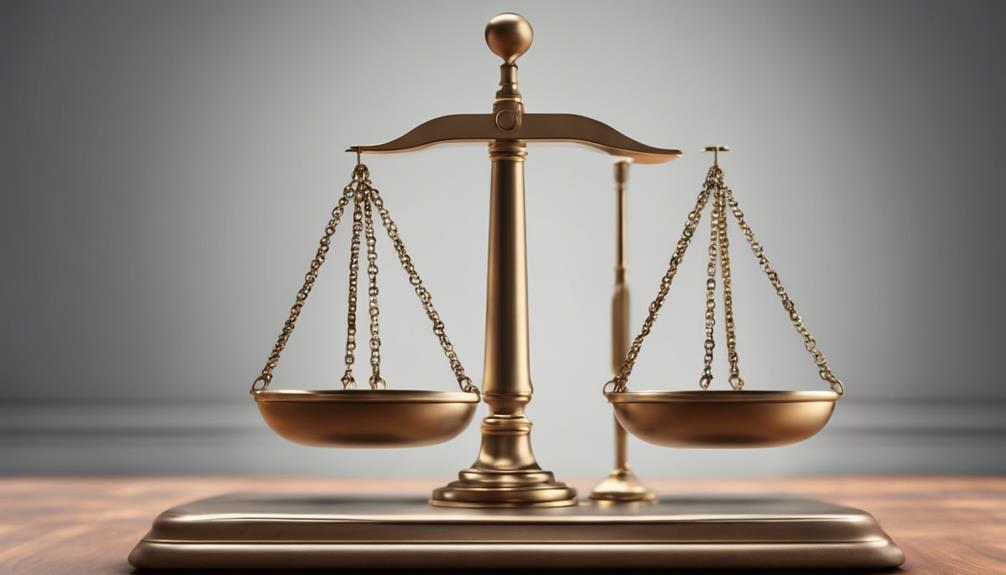
Considering the financial dynamics at play in a divorce, various factors come into play when determining the payment of attorney fees, with the court weighing the financial standing of both parties as a critical influencer in the decision-making process. In Texas, attorney fees are considered community property until the divorce is finalized. Interim fees can be requested during the ongoing divorce process based on financial need. It's crucial to note that bad faith actions like hiding assets or non-compliance with court orders can lead to one spouse being responsible for paying the other's attorney fees. Additionally, judges may order one spouse to pay the other's fees to ensure equal access to legal representation. Fairness and equal representation are significant considerations for the court when making payment determinations regarding attorney fees in a divorce. Below is a table summarizing the key factors influencing fee payment:
| Factors | Influence on Fee Payment |
|---|---|
| Financial Status | Critical consideration |
| Bad Faith Actions | Responsibility for fees |
| Interim Fees | Based on financial need |
| Equal Representation | Ensuring fairness |
| Court Orders | Compliance importance |
Financial Considerations and Strategies
Understanding the financial implications and implementing effective strategies play a crucial role in navigating the payment of attorney fees during a divorce. It's important for both spouses to consider the financial status of each party when requesting payment of attorney fees.
In the legal realm, judges have the authority to order one spouse to pay the other's attorney fees based on just and right division principles. Temporary fees can be sought through a Motion for Interim Attorney Fees to cover ongoing legal costs. Spouses may need to provide justification for the reasonableness of the fees requested by their attorneys.
Exploring alternative payment sources, such as selling nonliquid assets or incurring debt, can be viable strategies to cover attorney fees during the divorce process. By being mindful of the financial aspects and leveraging available legal options, both parties can work towards a fair resolution in the payment of attorney fees.
State-Specific Laws and Resources

Navigating the intricacies of divorce laws and available resources in your state can significantly impact the outcome of attorney fee payments. In Texas, understanding the state-specific laws related to attorney fees is crucial for a successful divorce process. Here are some key points to consider:
- Attorney fees: In Texas, attorney fees can be requested in the original petition for divorce.
- Financial status: Texas courts take into account the financial status of both parties when determining attorney fee payments.
- Income disparity: Judges may order one spouse to pay the other's attorney fees in cases of significant income disparity.
- Bad behavior: Engaging in bad behavior during the divorce process, like hiding assets or not complying with court orders, can result in paying the other party's attorney fees.
- Interim fees: Interim attorney fees can be requested to ensure legal representation for both parties throughout the divorce process.
Understanding these nuances can help you navigate the legal landscape effectively and secure fair attorney fee payments in Texas courts.
Negotiating Attorney Fees Efficiently
Let's smoothly shift our focus to efficiently negotiating attorney fees by strategizing smartly and communicating effectively during the divorce process. When dealing with attorney fees, it's crucial to discuss your financial situation openly with your legal representative to assess if your spouse can be held accountable for covering these costs. Providing evidence of your spouse's higher income or financial advantage can strengthen your case for them to pay your attorney fees. Negotiation plays a key role here; aim to reach a mutual agreement with your spouse or their attorney on sharing or covering the attorney fees to prevent court intervention. Be ready to justify the reasonableness of the fees and expenses incurred during the process. If your spouse is unwilling or unable to cover these costs, explore alternative payment arrangements like selling assets or securing a loan. Efficient negotiation is the cornerstone of getting your attorney fees paid in a divorce.
| Efficient Negotiation Tips | |
|---|---|
| Discuss Financial Situation | Provide Evidence of Spouse's Higher Income |
| Negotiate with Spouse | Justify Attorney Fees & Expenses |
| Consider Alternative Payments | Avoid Court Intervention |
Frequently Asked Questions
Who Loses the Most in a Divorce?
In a divorce, the spouse with higher income or more assets may bear more legal fees. Financial disparities impact who shoulders expenses. Court decisions consider income and assets. Fair representation access involves financial need and conduct influences fees responsibility.
Can My Spouse Make Me Pay Her Divorce Attorney Fees in Texas?
We understand the concern about spouses making each other pay attorney fees in Texas. Financial circumstances, assets, and behavior influence this decision. It's crucial to address attorney fees in the original petition for the court to consider them.
Who Pays for a Divorce in Texas?
We share insights on who pays for a divorce in Texas based on financial circumstances and court orders. Factors like income and assets influence fee payments. Community property laws affect division. Seeking temporary fees through a Motion for Interim Attorney Fees can assist.
How to Get a Free Divorce in Texas?
Getting a free divorce in Texas isn't possible, but cost-reducing options exist. Seek assistance from county legal clinics, pro bono services, or apply for fee waivers. With diligence, affordability in divorce proceedings can be achieved.
Conclusion
In the journey of divorce, remember: 'You get what you pay for.' By seeking legal guidance and understanding your options for attorney fee payment, you can navigate this challenging time with confidence and support.
Don't let financial concerns hold you back from obtaining the representation you deserve. Stay informed, stay proactive, and remember that your well-being is worth the investment in quality legal assistance.
Allison is the driving force behind our content, ensuring that every piece of information we share is both empowering and insightful. With a keen eye for detail and a deep understanding of the divorce process, Allison curates content that speaks directly to the needs of our audience. Her expertise ensures that How Get Divorce remains a trusted and authoritative source of guidance for those navigating the difficult waters of divorce.
Navigating the Divorce Process
How Much Does It Cost to Get a Divorce in Florida: a Complete Guide
Open the door to understanding the intricate costs of divorce in Florida for a couple with assets and complex custody, revealing surprising insights.

Imagine a scenario in which a couple, who owns considerable assets and has a complicated arrangement for child custody, opts to file for divorce in Florida. The financial impact of this situation can be significant, leading to inquiries regarding the overall costs and the strategies for managing them efficiently.
Understanding the breakdown of costs, from legal fees to court expenses, is crucial for anyone navigating the divorce process in Florida. By exploring the nuances of divorce costs in the state and the various factors that influence them, individuals can make informed decisions about their next steps in this challenging process.
Key Takeaways
- Divorce costs in Florida range from $5,000 to $30,000, influenced by various factors.
- Uncontested divorces cost under $500 for DIY paperwork or up to $5,000 with lawyer assistance.
- Contested divorces in Florida can range from thousands to tens of thousands of dollars.
- Hiring a divorce lawyer in Florida averages $300 per hour, impacting overall divorce expenses.
Average Cost of Divorce in Florida
When considering the average cost of divorce in Florida, it's essential to understand the varying factors that can significantly impact the overall expenses involved.
In Florida, the average cost of divorce ranges between $5,000 and $30,000. This range is influenced by various factors such as marital property, debts, presence of children under 18, alimony requests, attorney fees, and the duration of legal proceedings.
The financial implications of divorce can be substantial, especially when legal representation is needed. On average, lawyers in Florida charge around $300 per hour, which can quickly add up throughout the divorce process.
Additionally, the willingness of both spouses to compromise and the decision to hire experts for evaluations can also affect the total cost of divorce.
Understanding these financial considerations and planning accordingly can help spouses navigate the complexities of divorce in Florida more effectively.
Uncontested Divorce Costs in Florida

How do uncontested divorce costs in Florida compare to traditional legal proceedings? In Florida, uncontested divorce costs can vary significantly depending on the approach taken. Here is a breakdown of the costs associated with uncontested divorces in Florida:
| Aspect | Cost Range | Details |
|---|---|---|
| DIY Paperwork | Under $500 | Can be a cost-effective option for couples in agreement. |
| Lawyer Assistance | $3,000-$5,000 | Hiring a lawyer can provide legal guidance but at a higher cost. |
| Filing Fees | $408-$409 | Required fees for filing the divorce paperwork with the court. |
| Online Services | Under $650 | Online services offer a middle ground in terms of cost and assistance. |
Factors such as mutual agreement between spouses and minimal court involvement contribute to the lower costs of uncontested divorces in Florida. Additionally, individuals who cannot afford traditional legal fees may explore options like the Application for Determination of Indigent Status to help reduce costs.
Contested Divorce Expenses in Florida
Contested divorce expenses in Florida can vary significantly based on the complexity of the case, ranging from several thousand dollars to tens of thousands. When navigating a contested divorce in Florida, individuals may encounter various costs that contribute to the overall financial implications of the legal process. Some key factors influencing the contested divorce cost include:
- Expert Witnesses: In cases requiring specialized knowledge, such as child custody evaluations or financial assessments, the involvement of expert witnesses can escalate expenses.
- Property Division: Evaluating and dividing assets in a contested divorce often involves hiring appraisers to determine the value of properties, businesses, or other shared assets.
- Court Filing Fees: Alongside attorney fees, court filing fees and document serving costs are essential components that impact the total expenses of a contested divorce in Florida.
Understanding these financial issues is crucial for individuals going through a contested divorce, as it helps in anticipating and managing the costs associated with the legal proceedings.
Cost of Divorce Lawyer in Florida
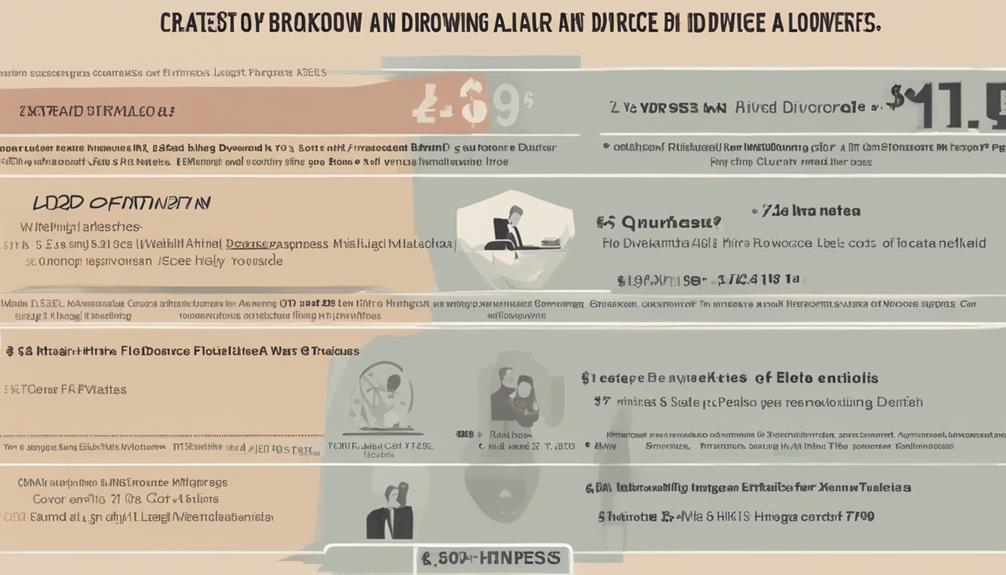
Divorce lawyer fees in Florida typically range from an average hourly rate of $300, with retainer fees falling between $2,000 and $5,000. Attorney fees in the state can vary between $260 and $330 per hour, depending on various factors such as case complexity, assets involved, and whether there are children in the picture.
It's essential to consider these aspects when budgeting for legal representation during a divorce. Additionally, Florida law mandates transparency in the types of retainers lawyers use when hired for divorce cases. This transparency ensures that clients understand how their money is being allocated throughout the legal process, offering a level of reassurance during what can be a challenging time.
When navigating the court system, filing paperwork, and advocating for your rights, having a knowledgeable and compassionate attorney by your side can make a significant difference in the outcome of your case.
Factors Affecting Florida Divorce Costs
Considering the multiple facets involved in divorce proceedings, understanding the factors that influence the costs in Florida is crucial for individuals embarking on this legal journey. When it comes to Florida divorce costs, several key elements play a significant role:
- Child Custody and Support: Disputes regarding child custody, visitation rights, and child support can escalate legal fees due to the complexity and emotional nature of these issues.
- Alimony: Claims for alimony can substantially impact the overall expenses of a divorce in Florida, especially if there are disagreements over the amount and duration of support.
- Property Division: Complex property and debt issues often lead to higher divorce costs in Florida, as the equitable distribution of assets requires meticulous evaluation and negotiation.
These factors, along with the need for expert witnesses, hourly rates charged by attorneys, and court costs, all contribute to the financial matters that individuals face when navigating a divorce in Florida. Understanding these influences can help individuals prepare for the potential costs associated with their divorce proceedings.
Frequently Asked Questions
How Much Does It Cost to Get a Divorce in Florida if Both Parties Agree?
If both parties agree, a divorce in Florida can cost less, with DIY paperwork under $500 and online help under $650. Legal assistance typically ranges from $3,000 to $5,000, while filing fees are around $408 to $409.
What Is the Cheapest Way to Get a Divorce in Florida?
Getting a divorce in Florida on a budget? Opting for an uncontested divorce is your best bet. With costs under $500 for DIY paperwork or around $650 with online assistance, it's a cost-effective solution for separations.
How Much Is the Filing Fee for Divorce in Florida?
The filing fee for divorce in Florida ranges from $408 to $409. It's a mandatory cost for initiating the process in Florida courts, covering paperwork processing. Budgeting for this fee is crucial to avoid delays in proceedings.
Can My Spouse Make Me Pay Her Divorce Attorney Fees in Florida?
We understand the concern about spousal payment for attorney fees in Florida. Courts may order one spouse to cover the other's fees based on need and ability to pay. Consulting an attorney for personalized guidance is crucial.
Conclusion
In conclusion, navigating the costly waters of divorce in Florida can be a challenging journey. Despite our best efforts to keep expenses low, the irony is that the emotional and financial toll can often exceed our expectations.
Remember to tread carefully, seek guidance when needed, and prioritize finding a resolution that's both fair and affordable. The price of divorce may be steep, but the cost of peace of mind is priceless.
Allison is the driving force behind our content, ensuring that every piece of information we share is both empowering and insightful. With a keen eye for detail and a deep understanding of the divorce process, Allison curates content that speaks directly to the needs of our audience. Her expertise ensures that How Get Divorce remains a trusted and authoritative source of guidance for those navigating the difficult waters of divorce.
Navigating the Divorce Process
How Soon Can You Get Married After a Divorce?
Delve into the intricacies of remarriage post-divorce in Texas and discover the crucial factors influencing the timing.

In Texas, individuals are required to wait 30 days following the finalization of their divorce before they are permitted to enter into another marriage.
The timing of when to tie the knot again after a divorce can be a complex decision influenced by various factors. From legal obligations and emotional readiness to financial implications and the well-being of any children involved, there are crucial considerations to ponder.
Understanding the nuances surrounding this matter can help individuals navigate the post-divorce landscape with clarity and foresight, ensuring a smoother transition into a new chapter of their lives.
Key Takeaways
- Compliance with state waiting periods is crucial to remarry legally and avoid complications.
- Emotional readiness through therapy and reflection is essential before entering a new marriage.
- Financial considerations like alimony and asset review are vital when remarrying.
- Consider the impact on children and ensure open communication to ease the transition into remarriage.
Legal Waiting Periods
When considering the legal waiting periods after a divorce, it's essential to understand the specific requirements set by each state to ensure a smooth remarriage process. In Texas, the law mandates a 30-day waiting period post-divorce before entering into a new marriage. This waiting period is crucial as it allows individuals time to reflect on their decisions and ensures they're ready for a new commitment. Exceptions to this waiting period include scenarios where individuals wish to remarry their former spouse immediately. In certain cases, judges have the authority to waive this waiting period, typically for reasons such as deployment or health emergencies.
It is important to note that failing to comply with the waiting period can lead to legal challenges such as bigamy charges. Thus, to secure a remarriage without potential legal ramifications, strict compliance with the waiting period is necessary. By understanding and adhering to the legal requirements set by the state, individuals can navigate the remarriage process smoothly and confidently.
Emotional Readiness

Understanding your emotional readiness is a crucial aspect to consider before deciding to remarry after a divorce. It's important to take the time needed to heal and reflect on past experiences to make an informed decision about remarriage. Seeking therapy or counseling to address any unresolved emotions from the previous marriage can significantly contribute to your emotional readiness.
Additionally, understanding your personal goals, values, and expectations for a new relationship is essential before considering remarriage. Here are some practical steps to help you assess your emotional readiness:
- Seek therapy or counseling to address unresolved emotions.
- Reflect on personal goals, values, and expectations.
- Build a strong support system of friends, family, or professionals.
Financial Considerations
Considering the financial impact of remarriage post-divorce is crucial for setting a solid foundation for your future together. When contemplating remarriage, it's essential to understand how alimony payments may be affected. In most states, these payments typically cease upon remarriage, directly impacting your financial situation.
Reviewing beneficiary designations on financial accounts is also vital to ensure your assets are distributed according to your wishes in the event of any unforeseen circumstances. Additionally, taking into account how child support payments may be influenced by remarriage is crucial for effective financial planning.
Evaluating property and asset division agreements from the previous divorce is important to avoid any conflicts or misunderstandings in the future. Setting clear financial goals and openly discussing them with your future spouse can help align your visions and ensure a harmonious financial future together.
Impact on Children

Children navigating their parents' remarriage post-divorce may experience emotional challenges that require careful consideration and support. When it comes to the impact on children, rushing into a new marriage can lead to instability and hinder their ability to cope with the divorce process. To navigate this sensitive time effectively, open communication plays a pivotal role in helping children express their feelings and concerns.
Here are some key points to consider:
- Loyalty Conflicts and Abandonment: Children may struggle with conflicting loyalties or feelings of abandonment if a parent rushes into a new marriage too quickly after a divorce.
- Communication is Key: Engaging in open and honest conversations with children about the upcoming marriage can help alleviate anxiety and uncertainty.
- Building a Strong Foundation: Establishing a strong foundation with children before introducing a new spouse can aid in creating a smoother transition and fostering acceptance of the new family dynamic.
Role of Legal Counsel
Navigating the complexities of remarriage after divorce often necessitates the involvement of legal counsel to ensure a smooth and legally compliant process. A family law attorney can provide expert legal guidance on the state-specific laws and requirements governing remarriage after divorce. They can assist in understanding the waiting period and waiver process, expediting the necessary steps for remarriage.
By seeking the help of a legal professional, individuals can ensure the protection of their rights and address all legal considerations before entering a new marriage. Legal representation is crucial to prevent potential issues such as bigamy charges or conflicts over property division that may arise during the remarriage process.
With the assistance of a knowledgeable family law attorney, individuals can navigate the legal requirements with confidence and clarity, making the transition into a new marital relationship smoother and legally sound.
Frequently Asked Questions
How Soon Can You Marry Someone After a Divorce?
We understand the urgency post-divorce, but legal guidelines dictate the waiting period before remarriage. Consult a family law attorney for the best course of action. Navigating this process correctly is crucial.
How Soon Is Too Soon to Remarry After Divorce?
Getting remarried too soon after a divorce can pose legal risks and emotional challenges. It's crucial to allow time for healing and reflection to build a strong foundation for a new relationship.
Can You Get Engaged While Going Through a Divorce?
Sure thing! Engaging while divorcing is legally fine. It won't affect the process or wait time to remarry. An engagement is about future plans, not the legal divorce. It's important to separate engagement from actual remarriage.
Is It Hard to Get Married After Divorce?
Getting married after divorce in Texas may pose challenges due to the mandatory waiting period. Judges can waive it for valid reasons. To avoid legal issues, finalize the divorce, adhere to the waiting period, and seek legal counsel for guidance.
Conclusion
We understand that waiting 30 days to remarry after a divorce may seem difficult, but it's crucial to follow the legal requirements for a smooth transition.
By waiting, you can ensure a legally secure marriage without any potential issues like bigamy charges.
Remember, taking the time to properly finalize your divorce and wait the 30 days will ultimately lead to a healthier and more stable next step in your life.
Allison is the driving force behind our content, ensuring that every piece of information we share is both empowering and insightful. With a keen eye for detail and a deep understanding of the divorce process, Allison curates content that speaks directly to the needs of our audience. Her expertise ensures that How Get Divorce remains a trusted and authoritative source of guidance for those navigating the difficult waters of divorce.
-

 Navigating the Divorce Process2 months ago
Navigating the Divorce Process2 months agoNavigating the Complexity: Divorce Document Preparation Services Explained
-

 Life After Divorce2 months ago
Life After Divorce2 months agoTD Jakes: Life After Divorce – A Journey of Healing
-

 Financial Aspects2 months ago
Financial Aspects2 months agoFinancial Advisor's Guide to Navigating Divorce Finances
-

 Supporting Children Through Divorce2 months ago
Supporting Children Through Divorce2 months agoPositive Effects of Divorce on Children: A Guide to Understanding
-

 Navigating the Divorce Process2 months ago
Navigating the Divorce Process2 months agoDivorce Lawyers New Orleans: Your Ultimate Guide to Legal Separation and Family Law
-

 Navigating the Divorce Process2 months ago
Navigating the Divorce Process2 months agoNavigating Divorce with a Muslim Divorce Lawyer
-

 Directory2 months ago
Directory2 months agoCompassionate Vista Divorce Attorney | Family Law Help
-

 Navigating the Divorce Process2 months ago
Navigating the Divorce Process2 months agoUnderstanding Dominican Republic Divorce Law








































